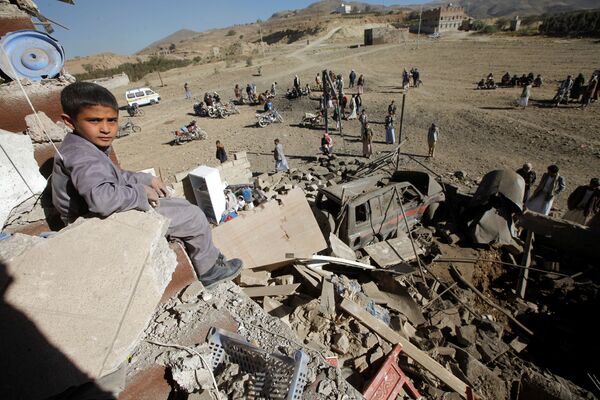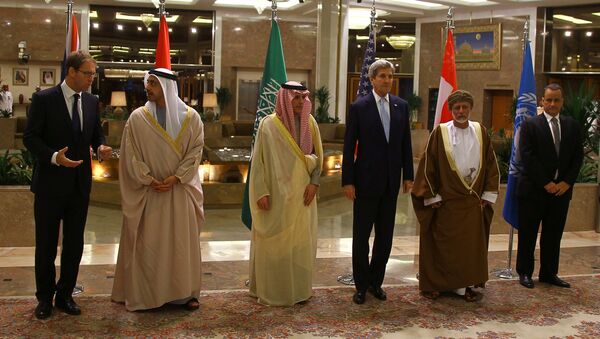On December 18, the Foreign Ministers of the United States, United Kingdom, Saudi Arabia and the United Arab Emirates met with the UN Special Envoy and the Omani Minister Responsible for Foreign Affairs to discuss a peace agreement in Yemen.
Worked with Saudi Arabia, Oman, UAE, UN, UK to chart a way forward on #Yemen, including urgent need for ceasefire & implementing roadmap. pic.twitter.com/hRMW5fFgXf
— John Kerry (@JohnKerry) December 18, 2016
Tobias Ellwood, UK Minister for the Middle East said in a statement that the meeting made clear there is a "real desire" to achieve peace in Yemen and the UK would continue to play a "central role" in supporting that aim.
"I call on all parties to work closely with the UN Special Envoy to bring about a peaceful resolution. This must start with the parties committing to engage with the UN on resuming a Cessation of Hostilities, including active participation in the De-escalation and Coordination Committee to ensure that ceasefire is effective and durable."
Utterly condemn suicide bombing in #Yemen. Meeting in Riyadh today to discuss political process only way to bring peace to country.
— Tobias Ellwood MP (@Tobias_Ellwood) December 18, 2016
Since March 2015, Saudi Arabia has been leading a military coalition in a war against Shiite Houthi rebels, supported by army units loyal to former Yemeni President Ali Abdullah Saleh. Ever since it commenced, the US and Britain have sold a vast volume of arms to the Saudi government, with receipts running to billions.
Concerns have been raised by human rights organizations about the use of cluster munitions since the conflict started — in May 2016 for example, Amnesty International (AI) uncovered significant evidence of the use of UK and US-made cluster munitions by Saudi Arabia in Yemen.
May 2016 — Amnesty exposed use of UK-made (also US, Brazilian) cluster munitions in Yemen https://t.co/qMbsAmanNT pic.twitter.com/aZHwhqwrOm
— amnestypress (@amnestypress) December 19, 2016
The UK government responded to these allegations by suggesting the bombs found by AI could be a vestige of a previous conflict in the region, adding that cluster munitions were last sold to the Saudis by the UK in 1989. The US went further by cutting arms sales to Saudi Arabia, but Hugo Wilcken, a researcher at Amnesty International, has told Sputnik the US "remains potentially complicit" in war crimes committed by the Saudi-led coalition, and it continues to supply arms to other members of the coalition.

However, the UK government's investigation has now confirmed Amnesty International's assertions. The use, stockpiling, production and transfer of cluster bombs has been banned under international law since 2010 under the Convention on Cluster Munitions, which has 108 signatories (of which the US and UK are two).
The Convention states cluster bombs pose a particular risk to civilians, as they release a multitude of miniature bombs over a wide area, leading to indiscriminate deaths in populated areas. Moreover, unexploded bomblets pose a high risk long-after a conflict has ended, and are costly and dangerous to locate and remove.
.@amnesty Int. says the #Saudi-led coalition is using #US & #UK made cluster bombs in #Yemen #StopArmingSaudi https://t.co/MZEaM6WaOw
— Marwan Al-Munyfi (@marwan18) September 15, 2016
Dr. Shavana Musa, a lecturer in Law at Manchester University, told Sputnik the report represented yet further proof of the extent the UK has "violated" its international obligations.
"Under both the Cluster Convention and the Arms Trade Treaty, the UK is completely prohibited from transferring any arms to countries that could be violating human rights and humanitarian law. The UK's own foreign office has listed Saudi Arabia as a 'country of concern' for many years, and Saudi Arabia's campaign has produced much civilian death, which could amount to a crime against humanity. The UK should not be transferring any arms at all."
As the Campaign Against Arms Trade (CAAT) records, Saudi Arabia has been a major buyer of UK weapons since the 1960s, and the two countries have long enjoyed a very close affiliation as a result. Could this exposure compromise the relationship?
Middle East analyst Catherine Shakdam "very much" doubts it.
"Britain needs Saudi money, so they'll stay friends. This said, with rising evidence of war crimes and the use of illegal weapons of war in Yemen, I don't think the US or UK will risk being caught with their hands in the cookie jar, actively promoting war crimes and crimes against humanity. There's a possibility that Britain may backpedal a bit, grandstand on human rights and deny their culpability, halting sales so they can claim the exports ceased when they found out about it. But I very much doubt it."
Concerns about the Saudi military using weapons in Yemen exported from the UK have been repeatedly raised during PMQs (Prime Minister's Questions) this year by Angus Robertson, the Scottish National Party leader in Westminster.
British built planes and bombs are killing civilians in Yemen. PM should admit UK is effectively part of war. #PMQs pic.twitter.com/QuHwEoYKp0
— Angus Robertson (@AngusRobertson) January 20, 2016
On December 14, he asked what it would take "for the UK to adopt an ethical foreign policy" in respect of Yemen. Prime Minister Theresa May responded that the intervention in Yemen is UN-backed, and stressed the relationship with Saudi Arabia was "important" to the UK government, particularly in the field of intelligence.




